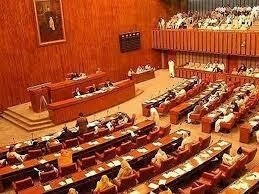The Pakistan Peoples Party (PPP), alongside other opposition parties in the National Assembly, including the Sunni Ittehad Council (SIC), have successfully compelled the government to defer the passage of the State-Owned Enterprises (Governance and Operations) Bill, 2024. This decision came after heated discussions and objections raised during a session dedicated to private members’ business.
Law Minister Azam Nazeer Tarar sought to present the supplementary agenda item, which included the introduction and passage of The State-Owned Enterprises (Governance and Operations) Bill, 2024, already passed by the Senate. However, opposition members, including SIC chief whip Amir Dogar and Jamiat Ulema-e-Islam-Fazl (JUI-F) MNA Aliya Kamran, objected to tabling the bill as a supplementary agenda item on a private members’ day.
Amir Dogar questioned whether the Leader of the Opposition had been consulted before bringing the supplementary agenda item. He emphasized that, according to parliamentary rules, it is mandatory to take the Leader of the Opposition into confidence before presenting any supplementary agenda items.
Syed Naveed Qamar, a leader from the PPP, suggested that the bill should be referred to the relevant committee for further deliberation before being passed by the House. This suggestion was supported by other opposition members who felt that more thorough scrutiny was necessary.
The Leader of the Opposition, Omar Ayub, expressed his concerns about the bill, stating that it would not effectively address the rising circular debt. He argued that the appointment of members to the boards of directors of state-owned enterprises (SOEs) should be based on merit rather than nepotism to ensure effective governance and operations.
In response, Law Minister Azam Nazeer Tarar acknowledged the governance issues addressed by the bill and agreed to refer it to the concerned committee for further discussion. He also mentioned that it was agreed in the business advisory committee, which included members from all parliamentary parties, to introduce the bill as a supplementary agenda item.
The bill, in its statement of objects and reasons, outlines the need for the State-Owned Enterprises (Governance and Operations) Act, promulgated in February 2023. The Act provides for matters related to the constitution of the boards of directors of SOEs. It emphasizes the necessity to reconstitute these boards to better align them with reform initiatives aimed at restructuring, transformation, and the privatization of certain entities. To achieve these objectives, the bill proposes strengthening the provisions for the removal of directors under this Act.
In total, seven bills were introduced in the House during the private members’ business session. These include “The South City University Bill, 2024,” “The Child Marriage Restraint (Amendment) Bill, 2024,” “The Constitution (Amendment) Bill, 2024 (Amendment in Article 175A and 215),” “The National Commission for Minorities Bill, 2024,” “The Constitution (Amendment) Bill, 2024 (Article 51 and 106),” “The Nippon Institute of Advanced Sciences Bill, 2024,” and “The High Courts (Establishment) (Amendment) Bill, 2024.”
The Constitution (Amendment) Bill, 2024, moved by Pakistan Tehreek-e-Insaf (PTI)’s Asad Qaiser, aims to ensure that the appointment of the chief election commissioner is made on a rotational basis from all provinces and that a procedure is established to ensure the appointment of judges based on merit rather than nepotism. The law minister agreed with this proposal, suggesting that a merit-based procedure should be adopted for judicial appointments.
The House referred “The International Institute of Technology, Culture and Health Sciences Bill, 2024” and “The State-Owned Enterprises (Governance and Operations) Bill, 2024” to the standing committees concerned for further deliberations before being presented for passage. The House passed “The Christian Marriage (Amendment) Bill, 2024” and “The Pakistan Psychological Council Bill, 2024.”
Earlier, the House adopted a motion authorizing the Speaker of the National Assembly to appoint a special committee on Kashmir comprising 22 members in proportion to their representation in the Lower House. The motion, moved by Law Minister Azam Nazeer Tarar, also authorized the speaker to include six senators, three each from the treasury and opposition parties based on their strength in the Senate. The speaker was further authorized to make changes in the composition of the committee as and when required.




